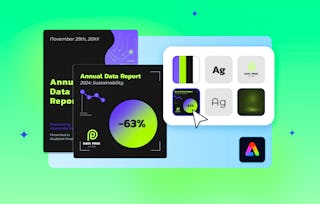Native advertising is a niche form of advertising that leverages the design and format of news and entertainment content. Native advertising is less about selling products and more about producing useful content for consumers who are in the ‘consideration’ phase of the advertising purchase funnel. Often in the form of news-like stories, native advertising has been shown to persuade consumers. Native advertising is affordable, and doesn’t require graphic design to get started. For these reasons, it’s a compelling advertising technique for small businesses. This course outlines a case study where a small travel startup used native advertising to drive hotel sales. Execution strategies for a successful, no-creative native campaign are laid out, including: gathering existing news coverage, ethical content seeding, and content generation.

Programmatic Advertising

Programmatic Advertising
This course is part of Concepts, Strategies, and Analytics in Performance Marketing and Digital Advertising Specialization


Instructors: Chris J. Vargo
11,681 already enrolled
Included with
71 reviews
What you'll learn
Execute native advertising campaigns in Taboola
How to target native ad campaigns to desired audiences
Use free tools to actively gather news coverage for native advertising
Develop content seeding strategies through incentive programs
Skills you'll gain
Details to know

Add to your LinkedIn profile
See how employees at top companies are mastering in-demand skills

Build your subject-matter expertise
- Learn new concepts from industry experts
- Gain a foundational understanding of a subject or tool
- Develop job-relevant skills with hands-on projects
- Earn a shareable career certificate

There are 6 modules in this course
This week's module focuses on understanding and mastering programmatic advertising through Google's Display Ad Certification.
What's included
1 reading1 peer review
In this series of lectures, students will explore the concept of native advertising, its various types, ethical concerns, and its impact on journalism. Through case studies, such as the defunct travel company Travel Pony, students will learn about the effectiveness of native advertising in overcoming credibility issues and increasing sales. The lectures will also discuss the role of the Federal Trade Commission in regulating native ads, targeting strategies based on location, purchase intent, and contextual relevance, and how to measure the success of native advertising campaigns using independent tools like Google Analytics.
What's included
3 videos1 assignment
This project offers three assignment options for students to apply their knowledge of native advertising, article pulling and targeting, and seeding strategies. Students will either analyze native ads from various news sites, assess the quality of articles for a local business and identify potential audiences, or create a seeding strategy for a small business. By completing this project, students will gain a deeper understanding of native advertising techniques, learn how to critically assess articles for potential native ad campaigns, and develop strategies for encouraging positive reviews from bloggers.
What's included
4 readings1 peer review
In this series of lectures, we explore the transformation of the advertising industry due to cord-cutting and the rise of streaming services, focusing on the shift towards connected TV advertising. We delve into the decline of traditional TV advertising and the factors contributing to the disruption of the cable TV industry. Furthermore, we discuss the impact of data collection on ad targeting, privacy concerns, and the balance between efficiency and cost. The lectures also cover the pros and cons of connected TV advertising, programmatic buying, and the challenges of measuring attention and attribution.
What's included
3 videos1 assignment
In this series of lectures, we delve into the intricacies of digital advertising, focusing on targeting, retargeting, prospecting, and look-alike audiences. We discuss the importance of balancing retargeting with prospecting and explore the benefits and potential pitfalls of using look-alike audiences. Additionally, we examine the complexities of constructing an advertising campaign by considering various targeting parameters and their interactions. The lectures also emphasize the importance of being critical of ad tech tools and methodologies, as well as addressing potential ethical concerns and privacy issues.
What's included
4 videos1 assignment
In this series of lectures, we will explore the evolution of the advertising industry, focusing on the shift from display to programmatic advertising and the rise of contextual advertising. We will delve into the ethical concerns surrounding third-party data collection, the death of cookies, and the challenges of brand safety. Additionally, we will examine the technologies and business models of various ad tech companies, as well as the future of ad tech regulation and the importance of transparency in the industry.
What's included
3 videos
Earn a career certificate
Add this credential to your LinkedIn profile, resume, or CV. Share it on social media and in your performance review.
Instructors


Offered by
Explore more from Marketing
 Status: Free Trial
Status: Free TrialUniversity of Colorado Boulder
 Status: Free Trial
Status: Free TrialUniversity of Colorado Boulder
 Status: Free Trial
Status: Free Trial Status: Free Trial
Status: Free Trial
Why people choose Coursera for their career

Felipe M.

Jennifer J.

Larry W.

Chaitanya A.
Learner reviews
- 5 stars
71.83%
- 4 stars
21.12%
- 3 stars
4.22%
- 2 stars
0%
- 1 star
2.81%
Showing 3 of 71
Reviewed on May 22, 2020
More practice and easiness to access webinar would be better :)
Reviewed on Feb 10, 2024
Loved it! Insightful and inspiring. Loved the guest lectures with industry practitioners
Reviewed on Oct 5, 2020
Definitely full of valuable information. I didn't learn about Native Advertising in School! Thank you University of Colorado.

Open new doors with Coursera Plus
Unlimited access to 10,000+ world-class courses, hands-on projects, and job-ready certificate programs - all included in your subscription
Advance your career with an online degree
Earn a degree from world-class universities - 100% online
Join over 3,400 global companies that choose Coursera for Business
Upskill your employees to excel in the digital economy
Frequently asked questions
To access the course materials, assignments and to earn a Certificate, you will need to purchase the Certificate experience when you enroll in a course. You can try a Free Trial instead, or apply for Financial Aid. The course may offer 'Full Course, No Certificate' instead. This option lets you see all course materials, submit required assessments, and get a final grade. This also means that you will not be able to purchase a Certificate experience.
When you enroll in the course, you get access to all of the courses in the Specialization, and you earn a certificate when you complete the work. Your electronic Certificate will be added to your Accomplishments page - from there, you can print your Certificate or add it to your LinkedIn profile.
Yes. In select learning programs, you can apply for financial aid or a scholarship if you can’t afford the enrollment fee. If fin aid or scholarship is available for your learning program selection, you’ll find a link to apply on the description page.
More questions
Financial aid available,
¹ Some assignments in this course are AI-graded. For these assignments, your data will be used in accordance with Coursera's Privacy Notice.

